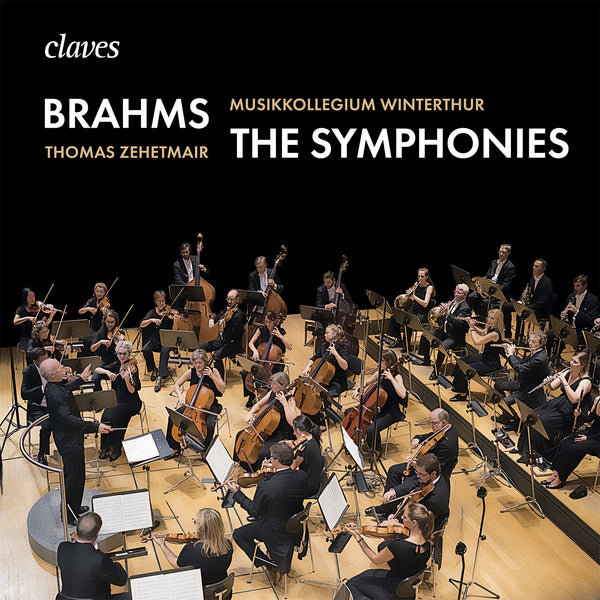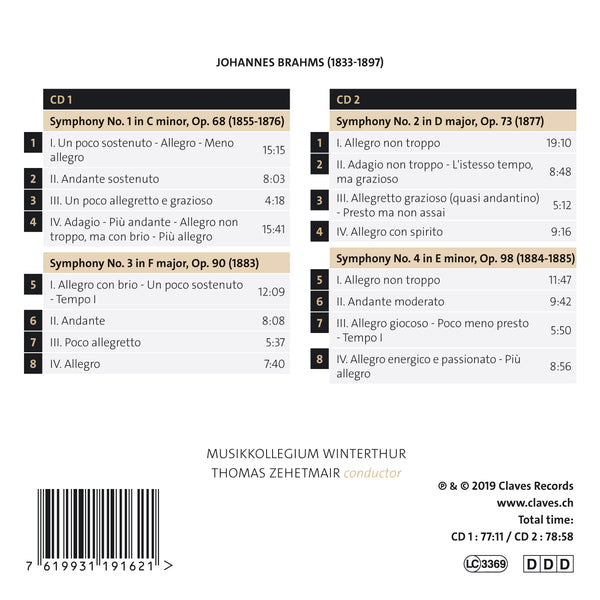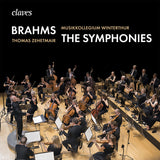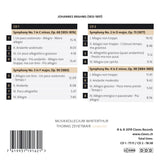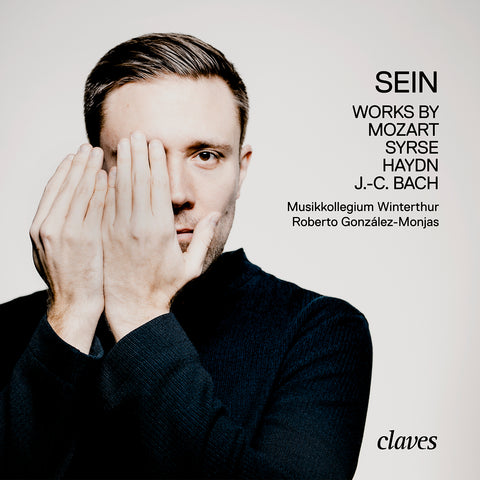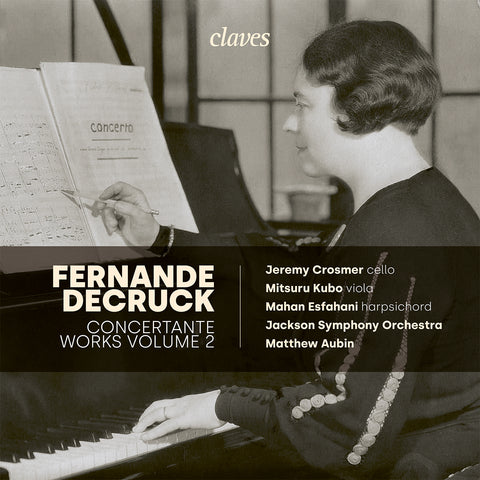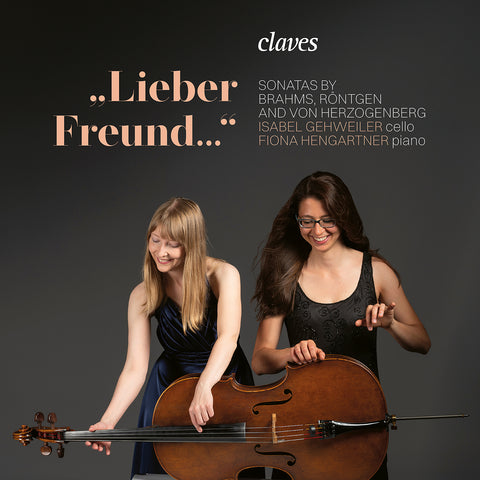(2019) Brahms: The Symphonies - Musikkollegium Winterthur, Thomas Zehetmair
Kategorie(n): Orchester
Hauptkomponist: Johannes Brahms
Orchester: Musikkollegium Winterthur
Dirigent: Thomas Zehetmair
CD-Set: 2
Katalog Nr.:
CD 1916/17
Freigabe: 24.05.2019
EAN/UPC: 7619931191621
Dieses Album ist jetzt neu aufgelegt worden. Bestellen Sie es jetzt zum Sonderpreis vor.
CHF 24.00
Dieses Album ist nicht mehr auf CD erhältlich.
Dieses Album ist noch nicht veröffentlicht worden. Bestellen Sie es jetzt vor.
CHF 24.00
Dieses Album ist nicht mehr auf CD erhältlich.
CHF 24.00
Inklusive MwSt. für die Schweiz und die EU
Kostenloser Versand
Dieses Album ist nicht mehr auf CD erhältlich.
Inklusive MwSt. für die Schweiz und die EU
Kostenloser Versand
Dieses Album ist jetzt neu aufgelegt worden. Bestellen Sie es jetzt zum Sonderpreis vor.
CHF 24.00
Dieses Album ist nicht mehr auf CD erhältlich.
This album has not been released yet.
Pre-order it at a special price now.
CHF 24.00
Dieses Album ist nicht mehr auf CD erhältlich.
CHF 24.00
Dieses Album ist nicht mehr auf CD erhältlich.
SPOTIFY
(Verbinden Sie sich mit Ihrem Konto und aktualisieren die Seite, um das komplette Album zu hören)
BRAHMS: THE SYMPHONIES - MUSIKKOLLEGIUM WINTERTHUR, THOMAS ZEHETMAIR
Johannes Brahms & Winterthur
The Musikkollegium Winterthur rounded off its 2018/19 concert season with a six-day Brahms Festival, during which – besides numerous other works by Johannes Brahms – the composer’s four symphonies were performed under Principal Conductor Thomas Zehetmair. Steeped in tradition and boasting a proud history dating back to 1629, the Swiss orchestra thus commemorated the years when Brahms was a frequent visitor to Winterthur and his compositions were released by the Winterthur music publisher Jakob Melchior Rieter-Biedermann. Eldest son of the successful Winterthur machinery manufacturer Heinrich Rieter, Rieter-Biedermann opened his publishing house in 1849 and the first two compositions appeared in 1856: Theodor Kirchner’s Albumblätter op. 9 and Hector Berlioz’s Les nuits d’été.
Kirchner, who had been employed as Winterthur’s full-time city organist since 1843, met Johannes Brahms for the first time that same year at the Lower Rhenish Music Festival in Düsseldorf and suggested the Winterthur music publisher to him. Brahms displayed an interest and as early as August 1856 embarked on the first of a total of 14 trips to Switzerland. The journey led to his first face-to-face encounter with Rieter-Biedermann, who first published a work by Brahms two years later – Volks-Kinderlieder mit hinzugefügter Clavierbegleitung, Den Kindern Robert u. Clara Schumann’s gewidmet (Children’s Folk Songs with additional piano accompaniment, dedicated to the children of Robert and Clara Schumann). Kirchner reported how Brahms soon became the talk of the town in Winterthur: “All of us, each in his own way, now revolve around Brahms, whom I am learning to appreciate more and more. Quite apart from his musical talent, the man has an abundance of wisdom and a hardworking attitude that I have rarely seen.”
Brahms was a frequent guest at the Haus zum Schanzengarten, where Rieter-Biedermann lived with his family. There would often be music-making, and both daughters of the house were highly accomplished pianists. Brahms enjoyed the fact that Rieter-Biedermann’s wife Louise took care of his well-being and kept his wardrobe in order: “Every morning, I feel grateful for how amiably and entirely maternally you have ensured that I feel at ease – not in my own skin – but very much so in my own clothes.” Mother Louise and daughter Ida also helped the famous composer, who was occupied with the German Requiem, to find appropriate passages from the Bible to set to music. They became close. Clara Schumann claimed to have sensed that Ida would have been a suitable wife for Brahms during her first visit to the Rieter- Biedermann household. Her observation to that effect was probably unnecessary. Brahms liked the “honoured and dear Fräulein,” as he addressed her in his only surviving letter to her: “What did I think I should have to say about how I found people like us to be so especially entitled and qualified for it – and how superfluous everything is in view of this happy event.” Superfluous due to Ida’s engagement that had just taken place – presumably anything but a “happy event” for Brahms himself …
Between 1858 and 1873, Brahms had a total of 22 compositions published by Rieter-Biedermann in Winterthur. These include such major works as the first Piano Concerto, the song cycle entitled Die schöne Magelone (The Fair Magelone), the Piano Quintet op. 34, the Paganini Variations op. 35 as well as A German Requiem. During these 15 years, Brahms wrote 165 letters to his publisher. Almost all of them are preserved today in the Musikkollegium Winterthur’s archives – valuable reminders of an important period in Winterthur’s history.
Read more in the booklet
***
Others albums with the Musikkollegium Winterthur
***
Thomas Zehetmair
Thomas Zehetmair is considered one of the most versatile musicians of our time and has been a fixture on the world’s concert stages and in the recording studio as a conductor and violinist with his own string quartet for many years. He has been chief conductor of the Musikkollegium Winterthur since the 2016/17 season. The orchestra’s recording of Anton Bruckner’s Third Symphony is testimony to this fruitful collaboration. Thomas Zehetmair was previously Music Director of the Orchestre de chambre de Paris and Artistic Partner of the Saint Paul Chamber Orchestra, Minnesota.
Between 2002 and 2014, he held the post of Music Director of the Royal Northern Sinfonia, transforming it into one of the United Kingdom’s leading orchestras, as documented by recordings of symphonies by Schubert, Schumann, Sibelius and Hans Gál as well as newly discovered works by Britten. Zehetmair continues to maintain relations with the orchestra as Conductor Laureate. He has been awarded honorary doctorates from the universities of Newcastle and Weimar. In the coming seasons, he will be giving guest appearances with the Helsinki Philharmonic, Seattle Symphony Orchestra, Svetlanov Symphony Orchestra, Moscow, and the São Paulo Symphony Orchestra. Thomas Zehetmair will be chief conductor of the Stuttgart Chamber Orchestra as of September 2019.
***
Other album with Thomas Zehetmair
(2019) Brahms: The Symphonies - Musikkollegium Winterthur, Thomas Zehetmair - CD 1916/17
Johannes Brahms & Winterthur
The Musikkollegium Winterthur rounded off its 2018/19 concert season with a six-day Brahms Festival, during which – besides numerous other works by Johannes Brahms – the composer’s four symphonies were performed under Principal Conductor Thomas Zehetmair. Steeped in tradition and boasting a proud history dating back to 1629, the Swiss orchestra thus commemorated the years when Brahms was a frequent visitor to Winterthur and his compositions were released by the Winterthur music publisher Jakob Melchior Rieter-Biedermann. Eldest son of the successful Winterthur machinery manufacturer Heinrich Rieter, Rieter-Biedermann opened his publishing house in 1849 and the first two compositions appeared in 1856: Theodor Kirchner’s Albumblätter op. 9 and Hector Berlioz’s Les nuits d’été.
Kirchner, who had been employed as Winterthur’s full-time city organist since 1843, met Johannes Brahms for the first time that same year at the Lower Rhenish Music Festival in Düsseldorf and suggested the Winterthur music publisher to him. Brahms displayed an interest and as early as August 1856 embarked on the first of a total of 14 trips to Switzerland. The journey led to his first face-to-face encounter with Rieter-Biedermann, who first published a work by Brahms two years later – Volks-Kinderlieder mit hinzugefügter Clavierbegleitung, Den Kindern Robert u. Clara Schumann’s gewidmet (Children’s Folk Songs with additional piano accompaniment, dedicated to the children of Robert and Clara Schumann). Kirchner reported how Brahms soon became the talk of the town in Winterthur: “All of us, each in his own way, now revolve around Brahms, whom I am learning to appreciate more and more. Quite apart from his musical talent, the man has an abundance of wisdom and a hardworking attitude that I have rarely seen.”
Brahms was a frequent guest at the Haus zum Schanzengarten, where Rieter-Biedermann lived with his family. There would often be music-making, and both daughters of the house were highly accomplished pianists. Brahms enjoyed the fact that Rieter-Biedermann’s wife Louise took care of his well-being and kept his wardrobe in order: “Every morning, I feel grateful for how amiably and entirely maternally you have ensured that I feel at ease – not in my own skin – but very much so in my own clothes.” Mother Louise and daughter Ida also helped the famous composer, who was occupied with the German Requiem, to find appropriate passages from the Bible to set to music. They became close. Clara Schumann claimed to have sensed that Ida would have been a suitable wife for Brahms during her first visit to the Rieter- Biedermann household. Her observation to that effect was probably unnecessary. Brahms liked the “honoured and dear Fräulein,” as he addressed her in his only surviving letter to her: “What did I think I should have to say about how I found people like us to be so especially entitled and qualified for it – and how superfluous everything is in view of this happy event.” Superfluous due to Ida’s engagement that had just taken place – presumably anything but a “happy event” for Brahms himself …
Between 1858 and 1873, Brahms had a total of 22 compositions published by Rieter-Biedermann in Winterthur. These include such major works as the first Piano Concerto, the song cycle entitled Die schöne Magelone (The Fair Magelone), the Piano Quintet op. 34, the Paganini Variations op. 35 as well as A German Requiem. During these 15 years, Brahms wrote 165 letters to his publisher. Almost all of them are preserved today in the Musikkollegium Winterthur’s archives – valuable reminders of an important period in Winterthur’s history.
Read more in the booklet
***
Others albums with the Musikkollegium Winterthur
***
Thomas Zehetmair
Thomas Zehetmair is considered one of the most versatile musicians of our time and has been a fixture on the world’s concert stages and in the recording studio as a conductor and violinist with his own string quartet for many years. He has been chief conductor of the Musikkollegium Winterthur since the 2016/17 season. The orchestra’s recording of Anton Bruckner’s Third Symphony is testimony to this fruitful collaboration. Thomas Zehetmair was previously Music Director of the Orchestre de chambre de Paris and Artistic Partner of the Saint Paul Chamber Orchestra, Minnesota.
Between 2002 and 2014, he held the post of Music Director of the Royal Northern Sinfonia, transforming it into one of the United Kingdom’s leading orchestras, as documented by recordings of symphonies by Schubert, Schumann, Sibelius and Hans Gál as well as newly discovered works by Britten. Zehetmair continues to maintain relations with the orchestra as Conductor Laureate. He has been awarded honorary doctorates from the universities of Newcastle and Weimar. In the coming seasons, he will be giving guest appearances with the Helsinki Philharmonic, Seattle Symphony Orchestra, Svetlanov Symphony Orchestra, Moscow, and the São Paulo Symphony Orchestra. Thomas Zehetmair will be chief conductor of the Stuttgart Chamber Orchestra as of September 2019.
***
Other album with Thomas Zehetmair
Return to the album | Read the booklet | Composer(s): Johannes Brahms | Main Artist: Thomas Zehetmair







